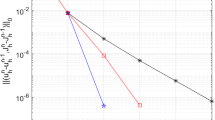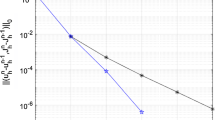Abstract
In this paper, an Arrow-Hurwicz iterative finite element method based on charge-conservation for solving the stationary inductionless magnetohydrodynamic equations is proposed and analyzed. The current density and electric potential are discretized by \(\textbf{H}(\textrm{div},\varOmega )\times L^2(\varOmega )\)-conforming finite element pairs, respectively, which maintains charge-conservation. The hydrodynamic unknowns are discretized by stable velocity-pressure finite element pairs. Furthermore, we use the Arrow-Hurwicz iterative method to decouple the velocity and pressure, which leads to that there is no large-scale saddle point system that needs to be solved at each iteration step except for the determination of the initial functions. It has been proven that the proposed method converges geometrically with a contraction number independent of the mesh width. Numerical results are presented to verify the results of theoretical analysis and the effectiveness of the proposed method.






Similar content being viewed by others
Data availability
Data sharing is not applicable to this article as no data sets were generated or analyzed during the current study.
References
Abdou, M., Ying, A., et al.: On the exploration of innovative concepts for fusion chamber technology. Fusion Eng. Des. 54, 181–247 (2001)
Abdou, M., Sze, D., Wong, C., Sawan, M., Ying, A., Morley, N., Malang, S.: US plans and strategy for ITER blanket testing. Fusion Sci. Technol. 47, 475–487 (2005)
Arrow, K., Hurwicz, L., Uzawa, H.: Studies in nonlinear programming. Standford University Press, Standford, CA (1958)
Badia, S., Martn, Alberto, F., Planas, R.: Block recursive LU preconditioners for the thermally coupled incompressible inductionless MHD problem. J. Comput. Phys. 274, 562-591 (2014)
Benzi, M., Golub, G.H., Liesen, J.: Numerical solution of saddle point problems. Acta Numer. 14, 1–137 (2005)
Chen, P., Huang, J., Sheng, H.: Some Uzawa methods for steady incompressible Navier-Stokes equations discretized by mixed element methods. J. Comput. Appl. Math. 273, 313–325 (2015)
Chen, P., Huang, J., Sheng, H.: Solving steady incompressible Navier-Stokes equations by the Arrow-Hurwicz method. J. Comput. Appl. Math. 311, 100–114 (2017)
Davidson, P.A.: An introduction to magnetohydrodynamics, in: Cambridge Texts in Applied Mathematics, Cambridge University Press, Cambridge, p. xviii+431 (2001)
Dong, X., He, Y.: Convergence of some finite element iterative methods related to different Reynolds numbers for the 2D/3D stationary incompressible magnetohydrodynamics. Sci. China Math. 59, 589–608 (2016)
Dong, X., He, Y., Zhang, Y.: Convergence analysis of three finite element iterative methods for the 2D/3D stationary incompressible magnetohydrodynamics. Comput. Methods Appl. Mech. Eng. 276, 287–311 (2014)
Gunzburger, M., Meir, A., Peterson, J.: On the existence, uniqueness, and finite element approximation of solution of the equations of stationary, incompressible magnetohydrodynamics. Math. Comput. 56, 523–563 (1991)
Gerbeau, J.-F., Le Bris, C., Lelivre, T.: Mathematical methods for the magnetohydrodynamics of liquid metals. Numerical Mathematics and Scientific Computation, Oxford University Press, Oxford, p. xiv+310 (2006)
Greif, C., Li, D., Schotzau, D., Wei, X.X.: A mixed finite element method with exactly divergence-free velocities for incompressible magnetohydrodynamics. Comput. Method. Appl. M. 199, 2840–2855 (2010)
Hiptmair, R., Li, L., Mao, S., Zheng, W.: A fully divergence-free finite element method for magnetohydrodynamic equations. Math. Models Methods Appl. Sci. 28, 659–695 (2018)
He, Y., Li, J.: Convergence of three iterative methods based on the finite element discretization for the stationary Navier-Stokes equations. Comput. Methods Appl. Mech. Eng. 198, 1351–1359 (2009)
He, Y.: Stability and convergence of iterative methods related to viscosities for the 2D/3D steady Navier-Stokes equations. J. Math. Anal. Appl. 423, 1129–1149 (2015)
Hecht, F.: New development in freefem++. J. Numer. Math. 20, 251–266 (2012)
Hu, K., Ma, Y., Xu, J.: Stable finite element methods preserving \(\nabla \cdot {B}= 0\) exactly for MHD models. Numer. Math. 135, 371–396 (2017)
Keram, A., Huang, P.: The Arrow-Hurwicz iterative finite element method for the stationary thermally coupled incompressible magnetohydrodynamics flow. J. Sci. Comput. 92, 11 (2022)
Lifschitz, Alexander E.: Magnetohydrodynamics and spectral theory. Springer, Netherlands (1989)
Li, L., Ni, M., Zheng: A charge-conservative finite element method for inductionless MHD equations. Part II: A robust solver. SIAM J. Sci. Comput. 41, B816-B842 (2019)
Long, X.: The analysis of finite element method for the inductionless MHD equations. PhD Dissertation. University of Chinese Academy of Sciences, pp. 1-123 (2019)
Li, L., Ni, M.: A charge-conservative finite element method for inductionless MHD equations. Part I: convergence. SIAM J. Sci. Comput. 41, B796–B815 (2019)
M, Ni., Munipalli, R., Morley, N.B., et al.: A current density conservative scheme for incompressible MHD flows at a low magnetic Reynolds number. Part I: on a rectangular collocated grid system. J. Comput. Phys. 227, 174-204 (2007)
Ni, M.-J., Munipalli, R., Huang, P., et al.: A current density conservative scheme for incompressible MHD flows at a low magnetic Reynolds number. Part II: on an arbitrary collocated mesh. J. Comput. Phys. 227, 205–228 (2007)
Nochetto, R.H., Pyo, J.H.: Optimal relaxation parameter for the Uzawa method. Numer. Math. 98, 695–702 (2004)
Ni, M.-J., Li, J.-F.: A consistent and conservative scheme for incompressible MHD flows at a low magnetic Reynolds number. Part III: On a staggered mesh. J. Comput. Phys. 231, 281–298 (2012)
Planas, R., Badia, S., Codina, R.: Approximation of the inductionless MHD problem using a stabilized finite element method. J. Comput. Phys. 230, 2977–2996 (2011)
Temam, R.: Navier-Stokes equations. North Holland, Amsterdam (1979)
Temam, R.: Navier-Stokes equations. North-Holland, Amsterdam (1984)
Yang, Y.B., Jiang, Y.L., Kong, Q.X.: The Arrow-Hurwicz iterative finite element method for the stationary magnetohydrodynamics flow. Appl. Math. Comput. 356, 347–361 (2019)
Zhang, X., Ding, Q.: Coupled iterative analysis for stationary inductionless magnetohydrodynamic system based on charge-conservative finite element method. J. Sci. Comput. 88, 1–32 (2021)
Zhang, X., Ding, Q.: A decoupled, unconditionally energy stable and charge-conservative finite element method for inductionless magnetohydrodynamic equations. Comput. Math. Appl. 127, 80–96 (2022)
Zhang, X., Wang, X.: A fully divergence-free finite element scheme for stationary inductionless magnetohydrodynamic equations. J. Sci. Comput. 90, 1–30 (2022)
Zhang, G.D., He, Y., Yang, D.: Analysis of coupling iterations based on the finite element method for stationary magnetohydrodynamics on a general domain. Comput. Math. Appl. 68, 70–788 (2014)
Zhou, X., Su, H., Tang, B.: Two-level Picard coupling correction finite element method based on charge-conservation for stationary inductionless magnetohydrodynamic equations. Comput. Math. Appl. 115, 41–56 (2022)
Zhu, T., Su, H., Feng, X.: Some Uzawa-type finite element iterative methods for the steady incompressible magnetohydrodynamic equations. Appl. Math. Comput. 302, 34–47 (2017)
Acknowledgements
The authors would like to thank the editor and anonymous reviewers for reviewing this paper and giving some comments and suggestions.
Funding
This work was supported by the Natural Science Foundation of China (NSFC) under grant 12161095, the Basic Research Program Project of Yunnan Province (No. 202001AU070068, 202201AT070032) and Yunnan Key Laboratory of Modern Analytical Mathematics and Applications (no. 202302AN360007).
Author information
Authors and Affiliations
Contributions
Y.B. Yang given out conceptualization, methodology, and formal analysis; Y.B. Yang and Y.D. **a wrote the main manuscript. Y.D. **a has done the numerical experiment. All authors have read and agreed to the published version of the manuscript.
Corresponding author
Ethics declarations
Conflict of interest
The authors declare no competing interests.
Human and animal ethics
This research does not involve human and animal ethics.
Additional information
Publisher's Note
Springer Nature remains neutral with regard to jurisdictional claims in published maps and institutional affiliations.
Rights and permissions
Springer Nature or its licensor (e.g. a society or other partner) holds exclusive rights to this article under a publishing agreement with the author(s) or other rightsholder(s); author self-archiving of the accepted manuscript version of this article is solely governed by the terms of such publishing agreement and applicable law.
About this article
Cite this article
**a, Y., Yang, YB. An Arrow-Hurwicz iterative method based on charge-conservation for the stationary inductionless magnetohydrodynamic system. Numer Algor (2024). https://doi.org/10.1007/s11075-024-01825-9
Received:
Accepted:
Published:
DOI: https://doi.org/10.1007/s11075-024-01825-9




